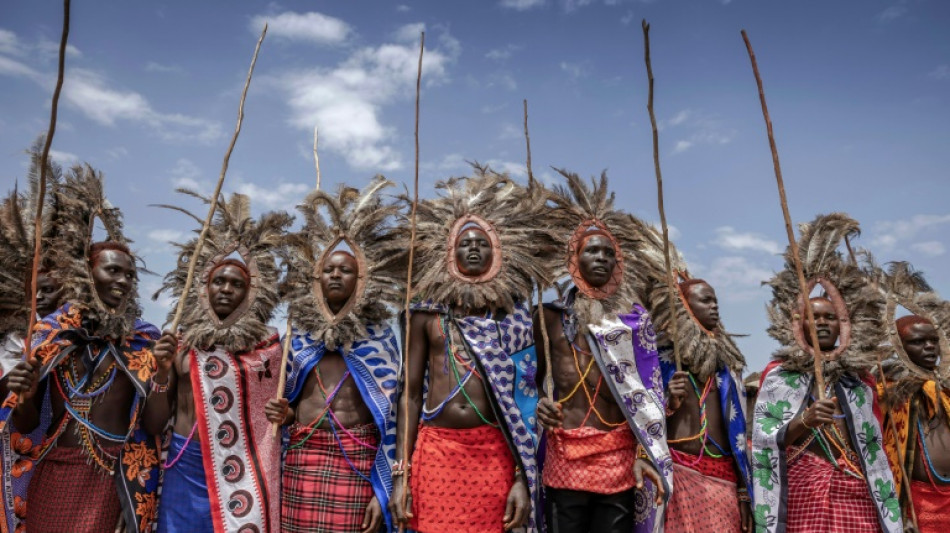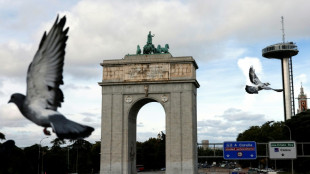
-
 YouTube star MrBeast buys youth-focused banking app
YouTube star MrBeast buys youth-focused banking app
-
French take surprise led over Americans in Olympic ice dancing

-
 Lindsey Vonn says has 'complex tibia fracture' from Olympics crash
Lindsey Vonn says has 'complex tibia fracture' from Olympics crash
-
US news anchor says 'hour of desperation' in search for missing mother

-
 Malen double lifts Roma level with Juventus
Malen double lifts Roma level with Juventus
-
'Schitt's Creek' star Catherine O'Hara died of blood clot in lung: death certificate

-
 'Best day of my life': Raimund soars to German Olympic ski jump gold
'Best day of my life': Raimund soars to German Olympic ski jump gold
-
US Justice Dept opens unredacted Epstein files to lawmakers

-
 Epstein taints European governments and royalty, US corporate elite
Epstein taints European governments and royalty, US corporate elite
-
Three missing employees of Canadian miner found dead in Mexico

-
 Meta, Google face jury in landmark US addiction trial
Meta, Google face jury in landmark US addiction trial
-
Winter Olympics organisers investigate reports of damaged medals

-
 Venezuela opposition figure freed, then rearrested after calling for elections
Venezuela opposition figure freed, then rearrested after calling for elections
-
Japan's Murase clinches Olympic big air gold as Gasser is toppled

-
 US athletes using Winter Olympics to express Trump criticism
US athletes using Winter Olympics to express Trump criticism
-
Japan's Murase clinches Olympic big air gold

-
 Pakistan to play India at T20 World Cup after boycott called off
Pakistan to play India at T20 World Cup after boycott called off
-
Emergency measures hobble Cuba as fuel supplies dwindle under US pressure

-
 UK king voices 'concern' as police probe ex-prince Andrew over Epstein
UK king voices 'concern' as police probe ex-prince Andrew over Epstein
-
Spanish NGO says govt flouting own Franco memory law

-
 What next for Vonn after painful end to Olympic dream?
What next for Vonn after painful end to Olympic dream?
-
Main trial begins in landmark US addiction case against Meta, YouTube

-
 South Africa open T20 World Cup campaign with Canada thrashing
South Africa open T20 World Cup campaign with Canada thrashing
-
Epstein accomplice Maxwell seeks Trump clemency before testimony

-
 Discord adopts facial recognition in child safety crackdown
Discord adopts facial recognition in child safety crackdown
-
Some striking NY nurses reach deal with employers

-
 Emergency measures kick in as Cuban fuel supplies dwindle under US pressure
Emergency measures kick in as Cuban fuel supplies dwindle under US pressure
-
EU chief backs Made-in-Europe push for 'strategic' sectors

-
 Machado ally 'kidnapped' after calling for Venezuela elections
Machado ally 'kidnapped' after calling for Venezuela elections
-
Epstein affair triggers crisis of trust in Norway

-
 AI chatbots give bad health advice, research finds
AI chatbots give bad health advice, research finds
-
Iran steps up arrests while remaining positive on US talks

-
 Frank issues rallying cry for 'desperate' Tottenham
Frank issues rallying cry for 'desperate' Tottenham
-
South Africa pile up 213-4 against Canada in T20 World Cup

-
 Brazil seeks to restore block of Rumble video app
Brazil seeks to restore block of Rumble video app
-
Gu's hopes of Olympic triple gold dashed, Vonn still in hospital

-
 Pressure mounts on UK's Starmer as Scottish Labour leader urges him to quit
Pressure mounts on UK's Starmer as Scottish Labour leader urges him to quit
-
Macron backs ripping up vines as French wine sales dive

-
 Olympic freeski star Eileen Gu 'carrying weight of two countries'
Olympic freeski star Eileen Gu 'carrying weight of two countries'
-
Bank of France governor Francois Villeroy de Galhau to step down in June

-
 Tokyo stocks strike record high after Japanese premier wins vote
Tokyo stocks strike record high after Japanese premier wins vote
-
'I need to improve', says Haaland after barren spell

-
 Italian suspect questioned over Sarajevo 'weekend snipers' killings: reports
Italian suspect questioned over Sarajevo 'weekend snipers' killings: reports
-
Von Allmen at the double as Nef seals Olympic team combined gold

-
 Newlyweds, but rivals, as Olympic duo pursue skeleton dreams
Newlyweds, but rivals, as Olympic duo pursue skeleton dreams
-
Carrick sees 'a lot more to do' to earn Man Utd job

-
 Olympic star Chloe Kim calls for 'compassion' after Trump attack on US teammate
Olympic star Chloe Kim calls for 'compassion' after Trump attack on US teammate
-
'All the pressure' on Pakistan as USA out to inflict another T20 shock

-
 Starmer vows to remain as UK PM amid Epstein fallout
Starmer vows to remain as UK PM amid Epstein fallout
-
Howe would 'step aside' if right for Newcastle


Kenya's young Maasai reconnect with their culture at Eunoto ceremony
With beaming smiles, their hair dyed a red ochre and adorned with a ceremonial headdress of ostrich feathers, the young Maasai men are busy taking selfies.
They have just completed the first day of Eunoto, a traditional ritual marking the transition from young warrior to adulthood.
"Today we are becoming men," 22-year-old medical student Hillary Odupoy says proudly, wearing sunglasses and a string of pearls across his bare chest.
Aged between 18 and 26, the young men came in their hundreds to the village of Nailare in southwestern Kenya, all from the same generation of "morans" ("warriors" in the Maasai language), a status they have held for a decade.
Many left their homes in the region to work or study in the cities of Kisii or Nairobi, or like Odupoy, further afield in the town of Machakos that lies more than seven hours away by road.
"It is one of the biggest ceremonies we have in our life. We can never meet in such multitude. It unites the Maasai community," explains Odupoy.
All wear red, the sacred colour of the Maasai -- from their hair which is coated in a mixture of ochre and oil to their traditional plaid cloth shukas.
This rite of passage brings together the families of the morans as well as local inhabitants and officials, in all several thousand people.
For five days, the Eunoto ceremony features traditional guttural chants, single-file dances on one leg, and the adumu -- the famous Maasai jump.
Cows are sacrificed and their blood drunk by the young men, whose hair is shaved from their heads by their mothers.
They then abandon the warrior's sword for the fimbo, the walking stick of the "elders".
- Abandoned rituals -
For centuries, Maasai men have gone through three rites of passage which have been inscribed since 2018 on the UNESCO list of intangible heritage in need of urgent safeguarding.
Enkipaata is the transition from boyhood to moran status, Eunoto, the passage to "young elder", and finally Olng'esherr marks the start of eldership status.
But such traditions of the Maasai, originally semi-nomadic herders living in southwestern Kenya and northern Tanzania, have had to adapt to the changes and demands of modern life.
The morans no longer spend two years in an isolated village, called "emanyatta", but meet there during school holidays to learn Maasai history and traditions, as well as the rules of life in society.
"Apart from having the Western education, traditional education also matters," says agriculture student Peter Ledama Ntuntai, 24.
"Our culture teaches us good behaviour."
Olerina Karia is one of the elders teaching these life lessons to the young Maasai.
"We teach them to be responsible citizens and members of society," says 52-year-old Karia.
"But all the traditions that were not the best for the survival of our community, such as killing a lion or the circumcision of girls, we teach them to get rid of them, especially if they collide with the law."
The killing of lions was to prove the bravery of the Maasai men, but has been illegal in Kenya for decades to protect the threatened animal.
The decline of the lion population was also threatening tourism, a precious source of income in the southwestern region of Kenya which is notably home to the emblematic Maasai Mara wildlife park.
- 'Dynamics of society have changed' -
In theory, young Maasai men can only marry after Eunoto, and their bride must have been circumcised.
But female circumcision, or female genital mutilation (FGM) has been banned in Kenya since 2011 and is officially no longer practised or recommended.
"You can be a Maasai without killing a lion and without going through FGM," says Hillary Odupoy.
Nowadays, some morans do not wait for Eunoto to marry.
"The dynamics of society have changed. When they go to school, sometimes they meet their fiancées there, they marry," says Olerina Karia.
"We adapt, we adjust."
For many, it is a matter of survival to preserve the traditions and culture of the most famous of Kenya's 45 tribes.
The Maasai are the 10th largest tribal grouping in Kenya with a population of less than 1.2 million, according to the last census in 2019.
"It is our greatest fear that in the near future we may not be able to practise this culture," says Olerina Karia.
"Other communities and other people are commercialising it, while the real owners who know how to practise it are not in the limelight."
O.M.Souza--AMWN



